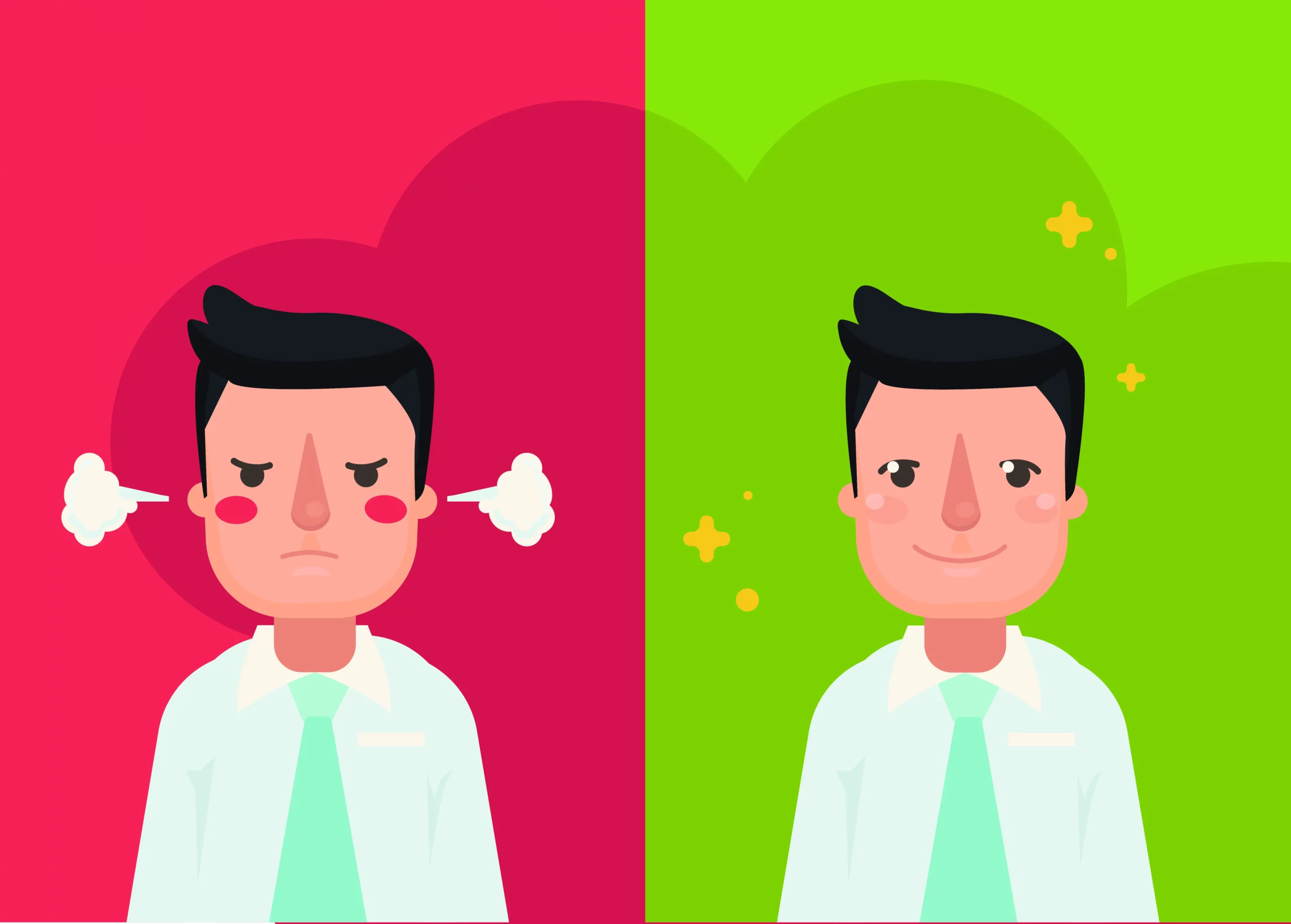Managing Being Angry When Not High: Practical Tips & Strategies
Managing being angry when not high is essential for individuals seeking to maintain sobriety and cultivate healthier emotional responses. Substance abuse can often exacerbate anger issues, making it crucial to develop effective strategies for managing this powerful emotion in sobriety. Learning to cope with anger in healthy ways can prevent relapse, strengthen relationships, and promote overall emotional well-being.
In this article, we will cover how substance abuse affects emotions, the differences between being angry when not versus not high, and practical anger management strategies.
How Does Substance Abuse Affect Emotions?
As the use of substances increases, the effects on an individual’s emotions become more noticeable. According to the National Survey on Drug Use and Health, 161.8 million individuals used some kind of substance, such as tobacco, alcohol, marijuana, heroin, and more in 2021. Substance abuse not only affects individuals but also has far-reaching consequences for families, communities, and society as a whole.
Substance abuse can profoundly affect emotions due to the impact of drugs and alcohol on the brain’s chemistry and neural pathways. It is essential to understand that substance use can be a form of coping with underlying emotional issues, mental health disorders, or stressful life circumstances. However, reliance on substances as a coping mechanism can worsen emotional difficulties and lead to a vicious cycle of addiction. Different substances may elicit varying emotional responses, but some common ways substance abuse affects emotions include:
- Feelings of Euphoria: Many drugs, such as opioids, cocaine, and amphetamines, can induce euphoria and intense pleasure by increasing the release of neurotransmitters like dopamine in the brain’s reward system. These artificially induced feelings of happiness can create a strong desire to repeat the substance use, leading to potential addiction.
- Emotional Numbing: Some individuals use substance abuse to cope with overwhelming emotions or traumatic experiences. Drugs and alcohol can act as emotional numbing agents, temporarily blocking painful feelings and memories. However, this suppression of emotions can lead to long-term emotional difficulties and hinder healthy emotional processing.
- Emotional Dysregulation: Chronic substance abuse can damage areas of the brain responsible for emotional regulation. As a result, individuals may struggle to manage their emotions effectively and experience intense emotional reactions to even minor stressors. This can lead to mood swings and an increase in irritability and anger.

Understanding Anger Without Substance Abuse
Understanding anger without substance abuse is crucial for individuals seeking healthier coping mechanisms and emotional regulation. While anger is a natural and common emotion experienced by everyone, substance abuse can exacerbate this emotion, leading to mood swings, irritability, and emotional dysregulation. When not managed appropriately, anger can negatively affect mental health, relationships, and overall well-being.
Read More: Embracing a Sober Minded Lifestyle in Mental Health and Addiction Recovery
The Differences Between Anger When High vs. Not High
The experience of anger can differ significantly when a person is high on substances compared to when sober. As mentioned above, substance use, such as alcohol or drugs, can alter brain function and influence emotions. This can manifest in differing levels of anger, including angry outbursts or angry thoughts. There are many differences that can arise between the angry feelings an individual experiences when high versus when they are not high. The biggest differences between the two include the following:
- Intensity of Anger: When under the influence of substances, anger may be experienced with heightened intensity, especially if the individual has a history of anger problems or aggressive behavior. Substances can lower inhibitions and amplify emotions, leading to explosive expressions of anger that might not occur when sober.
- Memory and Perception: Substance use can impact memory and perception, leading to misunderstandings or distorted recollections of events. This may contribute to misinterpretations of situations and trigger feelings of anger that are not based on accurate information.
- Emotional Lability: Being high can lead to emotional lability, meaning emotions can fluctuate rapidly and dramatically. Anger may arise and dissipate more quickly, but it can also be more intense and unpredictable. This can be seen in uncontrolled anger, angry outbursts, or random aggressive behavior.

Practical Tips & Strategies for Anger Management
By utilizing practical tips and strategies for anger management, individuals can empower themselves to navigate their emotions. This allows them to recognize their emotions, develop healthier responses to situations, and enhance their emotional intelligence. It is important to remember that anger is a natural emotion, and learning to manage it constructively is a skill that can benefit every aspect of life, including substance abuse and sobriety.
While many anger management techniques can be used, using practical strategies can be beneficial for addressing anger in daily life. Some of the practical tips and strategies for anger management include:
- Recognize Early Warning Signs: Becoming aware of the early signs of anger, such as increased heart rate, muscle tension, or irritability, can help individuals intervene before their emotions escalate. Mindful self-observation enables individuals to take proactive steps to manage anger.
- Practice Deep Breathing: Deep breathing exercises can be incredibly helpful in calming the nervous system and reducing anger. When anger rises, take slow, deep breaths, inhaling deeply through the nose, holding for a few seconds, and then exhaling slowly through the mouth.
- Use Relaxation Techniques: Engaging in relaxation techniques, such as progressive muscle relaxation, guided imagery, or meditation, can help reduce overall stress levels and prevent anger from reaching a boiling point.
- Engage in Physical Activity: Physical activity, such as walking, jogging, or practicing yoga, can release built-up tension and stress, providing a healthy outlet for anger.
- Practice Mindfulness: Mindfulness techniques involve staying present in the moment without judgment. Mindful awareness of emotions can help individuals observe anger objectively and respond more rationally.
- Use Humor: Using humor as a coping mechanism to diffuse anger in certain situations. Laughing or finding amusement in a challenging circumstance can help lighten the mood and put things into perspective.
- Writing in a Journal: Keeping a journal can effectively express and process emotions, including anger. Write about the feelings and triggers, and explore potential solutions or alternative perspectives.
- Develop Problem-Solving Skills: Anger often arises from perceived problems or challenges. Enhancing problem-solving skills can empower individuals to find constructive solutions rather than resorting to anger.
- Seek Professional Help: If anger issues persist or feel overwhelming, consider seeking support from a mental health professional or an anger management program. Professional guidance can offer personalized strategies and address underlying emotional issues.
The Benefits of Managing Anger in Sobriety
Managing anger in sobriety can have numerous benefits, not only for the individual in recovery but also for their relationships, mental health, and overall well-being. By controlling their anger, individuals can prevent causing relationship turmoil and mood swings and reduce stress. Some of the most common benefits of managing anger while in sobriety can include:
- Improved relationships
- Enhanced emotional regulation
- Increased self-awareness
- Better decision-making
- Improved physical and mental health
- Enhanced coping skills
- Better communication skills
- Increased empathy and understanding
Learn More: Sobriety: A Beginner’s Guide

Substance Abuse Treatment In Asheville, NC
When experiencing anger when not high, individuals may be viewed as angry when not abusing substances. Even if this is not true, this can cause mental health issues for the individual, resulting in extended substance abuse and addiction. Substance abuse from anger problems can be devastating for the emotional regulation of an individual. This is why it is essential to receive substance abuse treatment when this occurs.
At Oasis Recovery Center, we provide holistic, evidence-based, and individualized addiction treatment programs. We focus on the entire individual, addressing the root causes of addiction through various therapy techniques. Alongside addiction treatment, we also offer aftercare treatment to give our clients the skills and knowledge to continue their recovery outside of our facility.
If you or a loved one are struggling with substance abuse or anger issues, contact us today to learn more about our programs.







